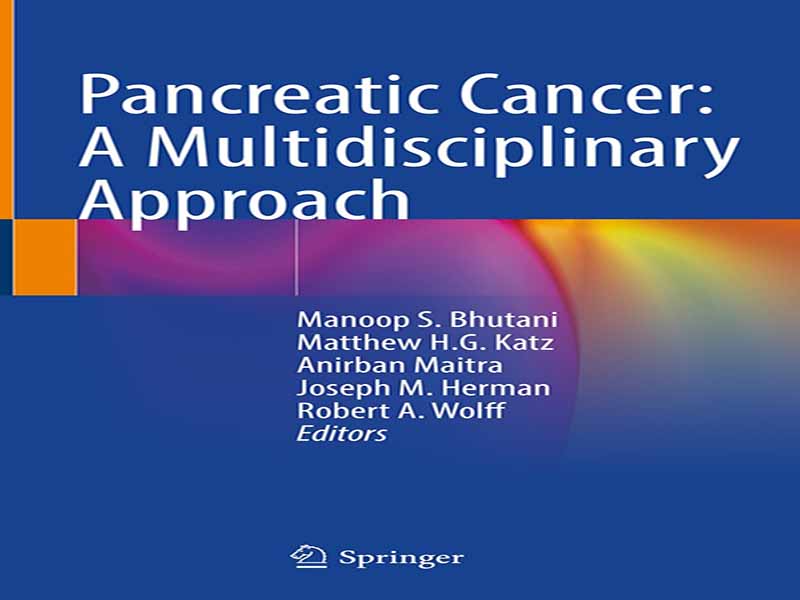- عنوان کتاب: Pancreatic Cancer / A Multidisciplinary Approach
- نویسنده: Manoop S. Bhutani
- حوزه: سرطان سینه
- سال انتشار: 2022
- تعداد صفحه: 392
- زبان اصلی: انگلیسی
- نوع فایل: pdf
- حجم فایل: 17.6 مگابایت
سرطان لوزالمعده یک بیماری وحشتناک است که تأثیر فزاینده ای بر مرگ و میر ناشی از سرطان در سراسر جهان دارد. این بیماری استثنای تاسف باری از روند کلی بهبود مرگ و میر ناشی از سرطان است. پیش بینی می شود تا سال 2030 سرطان لوزالمعده به دومین عامل اصلی مرگ و میر ناشی از سرطان در سراسر جهان تبدیل شود. نیاز قابل توجهی به گزینه های درمانی بهتر برای بهبود بقا و کیفیت زندگی بیماران مبتلا به سرطان پانکراس وجود دارد.
در دهه گذشته، مدیریت سرطان پانکراس به سمت یک رویکرد چند رشته ای با نتایج دلگرم کننده تغییر کرده است. چندین پیشرفت اخیر وجود داشته است، از غربالگری گروه های پرخطر گرفته تا پارادایم های نوظهور پزشکی دقیق، و همچنین داده های اخیراً گزارش شده برای تغییر عمل بیمارانی که با جراحی برداشته شده اند.
این کتاب مروری جامع و پیشرفته در این زمینه ارائه میکند و به عنوان یک منبع ارزشمند برای پزشکان و محققان علاقهمند به سرطان پانکراس خواهد بود. این کتاب دادههای مربوط به عوامل خطر و استعداد ژنتیکی سرطان پانکراس را توصیف میکند و استراتژیهای غربالگری فعلی و نتایج اولیه را برجسته میکند. تشخیص و مرحلهبندی سرطان لوزالمعده با تمرکز بر ارزیابیهای تصویربرداری، لاپاراسکوپی، بیوپسیهای آندوسکوپیک با هدایت اولتراسوند و بیومارکرها بررسی میشود. برای بیماری های پیشرفته و متاستاتیک موضعی، روش های درمانی سیستمیک، پرتودرمانی و شیمی درمانی مورد بحث قرار گرفته است. برای بیماری قابل برداشتن و برداشتن مرزی، مدیریت جراحی و درمان بعد از عمل بررسی میشود.
با توجه به رویکرد چندوجهی سرطان لوزالمعده، نقش متخصصان گوارش در مدیریت این بیماری با تاکید بر غربالگری، تشخیص، مدیریت علائم، و درمانهای موضعی با هدایت اولتراسوند آندوسکوپی و قرار دادن نشانگرهای فیدوشیال بررسی میشود. پارادایم های نوظهور در مدیریت سرطان لوزالمعده ارائه شده اند، مانند رویکردهای جراحی کم تهاجمی، فن آوری های حذفی محلی، رویکردهای تشعشع در حال ظهور، نشانگرهای زیستی مبتنی بر تصویر، بیوپسی های مایع، و پروفایل مولکولی سرطان پانکراس. این کتاب همچنین بینش ارزشمندی در مورد تغذیه و ادغام اولیه مراقبت های حمایتی/تسکین دهنده برای بیماران سرطان پانکراس ارائه می دهد.
این کتاب درسی منبع بسیار مفیدی برای پزشکان و دانشمندانی خواهد بود که با این بدخیمی چالش برانگیز سروکار دارند یا به آن علاقه مند هستند. با توجه به رویکرد چند رشته ای سرطان لوزالمعده، این کتاب متخصصانی از رشته های مختلف مانند گوارش، انکولوژی پزشکی، انکولوژی جراحی، انکولوژی پرتوشناسی، آسیب شناسی، رادیولوژی، پزشکی توانبخشی و تغذیه را گرد هم آورده است. مخاطبان این کتاب شامل انکولوژیستهای پزشکی، رادیوآنکولوژیستها، جراحان، متخصصان گوارش، دانشمندان پژوهشگر علاقهمند به سرطان لوزالمعده، همکاران و دستیاران آموزشدیده در جراحی، پرتوشناسی و انکولوژی پزشکی و همچنین گوارش هستند.
تمامی فصول توسط متخصصین رشته خود نوشته شده و شامل به روزترین اطلاعات علمی و بالینی می باشد. این بررسی جامع و در عین حال مختصر و پیشرفته در این زمینه به هدایت مدیریت بیمار و تحریک تلاشهای تحقیقاتی کمک میکند. این کتاب به تشریح رویکرد MD Anderson برای مدیریت سرطان پانکراس میپردازد، که عمدتا توسط کارشناسان مرکز سرطان اندرسون UT MD با برخی از همکاران همکار از سایر موسسات نوشته شده است. ما از همه همکاران برای وقت و تلاش خود در این تلاش بی نهایت سپاسگزاریم.
Pancreatic cancer is a dreadful disease with an increasing impact on cancer-related mortality worldwide. This disease is the unfortunate exception to the general trend of improvement in cancer-related mortality. Pancreatic cancer is projected to become the second leading cause of cancer-related deaths worldwide by 2030. There is a significant need for better treatment options to improve the survival and quality of life of pancreatic cancer patients.
In the last decade, management of pancreatic cancer has shifted towards a multidisciplinary approach with encouraging results. There have been several recent advances, from screening high-risk cohorts to emerging precision medicine paradigms, as well as recently reported practice-changing data for surgically resected patients.
This book provides a comprehensive, state-of-the-art review of this field and will serve as a valuable resource for physicians and researchers with an interest in pancreatic cancer. The book describes data about risk factors and genetic predisposition for pancreatic cancer and highlights current screening strategies and preliminary results. The diagnosis and staging of pancreatic cancer is reviewed, with focus on imaging evaluations, laparoscopy, endoscopic ultrasound-guided biopsies, and biomarkers. For locally advanced and metastatic disease, systemic therapy, radiation, and chemoradiation approaches are discussed. For resectable and borderline resectable disease, surgical management and perioperative therapy are reviewed.
Given the multimodality approach of pancreatic cancer, the role of gastroenterologists in the management of the disease is reviewed with emphasis on screening, diagnosis, symptoms management, and endoscopic ultrasound-guided local therapies and fiducial markers placement. Emerging paradigms in pancreatic cancer management are presented, such as minimally invasive surgical approaches, local ablative technologies, emerging radiation approaches, image-based biomarkers, liquid biopsies, and molecular profiling of pancreatic cancer. This book also provides a valuable insight into nutrition and early integration of supportive/palliative care for pancreatic cancer patients.
This textbook will serve as a very useful resource for physicians and scientists dealing with, or interested in, this challenging malignancy. Given the multidisciplinary approach of pancreatic cancer, this book has brought together experts from a variety of integrated disciplines such as gastroenterology, medical oncology, surgical oncology, radiation oncology, pathology, radiology, rehabilitation medicine, and nutrition. The audience for this book includes medical oncologists, radiation oncologists, surgeons, gastroenterologists, research scientists with interest in pancreatic cancer, fellows and residents training in surgical, radiation, and medical oncology as well as gastroenterology.
All chapters are written by experts in their fields and include the most up-to-date scientific and clinical information. This comprehensive and yet concise state-of-the-art review of this field will help guide patient management and stimulate investigative efforts. This book outlines The MD Anderson Approach to managing pancreatic cancer, written mostly by experts from UT MD Anderson Cancer Center with some collaborative colleagues from other institutions. We are extremely grateful to all the contributors for their time and effort in this endeavor.
این کتاب را میتوانید بصورت رایگان از لینک زیر دانلود نمایید.





































نظرات کاربران